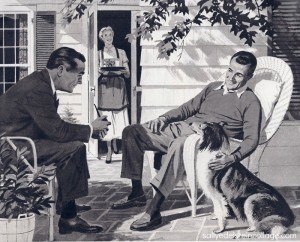Q&A- Part 1
Recently, I had the opportunity to sit down with Benny Zelkowicz, co-author of the middle-grade novel THE FIRST BOOK OF ORE: THE FOUNDRY’S EDGE. Standing at 5’10″ tall with his poofy coif of curls aflutter, Benny had a sort of restless look about him, like he had a million thoughts clinking about behind those stylish, photochromic eyeglasses. But he was generous enough to speak with me, and I’d like to share with you our exchange.
C: Hi Benny! Thank you so much for taking the time for this little chat. I know how busy you are – it’s really quite an honor. I was hoping I could ask you a few questions. Firstly, congratulations on the upcoming publication of your first book. Are you ready to call yourself an Author?
B: So nice to finally meet you. You are shorter than I imagined. Ready to call myself an author? Maybe when I actually get to hold the book in my hands, it will sink in- or more likely, when I hold the entire series of books it will feel real. Since writing is only one of many avenues I have been waltzing down over the past few years, it seems weird to claim it as my primary identity.
C: Hmmm, I see. And what would you say has been the most rewarding part of writing this book? And conversely, what has been the hardest?
B: In a way, the most rewarding and the hardest are one and the same- the world building. You nail down a few ‘rules’, things that define key aspects of how this new world operates, and those are usually the things that exited you about this idea in the first place. But that’s the equivalent of tossing a pebble in a pond- it creates ripples that intersect and move and affect everything else.
We didn’t want to take anything for granted- not even basic things like the color of the sky- but we wanted to be sure there was a logic and purpose behind every choice. It constantly brings up questions of history, biology, and physics, and often the answers that crop up necessitate key changes in the plot. It can be a frustrating rabbit hole, since you sometimes have to take several steps backwards, deconstruct something you have been working on for a long time, and rebuild it in a way that is consistent, logical, and compelling. And every move changes something else. But in the end, hopefully, you end up with a world that feels both original and credible, with weight and a pulse.
This reminds me of a story I read in elementary school. It was called “Rain Rain Go Away” by Isaac Asimov, and it was about a family who has some very strange neighbors move in next door. They are constantly fretting about the weather, always listening to forecasts on their radio, terrified of rain. I think they go on a picnic or something, and at the end of the story, they get caught in a downpour and melt, and the other family realizes their neighbors were made of sugar. And the other kids in the class all went “Whoa!” and I remember thinking “Why? Why are there sugar people? What do they want? Why do they live in secret? Are there more of them?” Of course, none of that was addressed in the story. But even at that age, I think I sensed that no creative choice really exists in a vacuum when it comes to fantasy. And sometimes the questions posed are more intriguing than the original answer. Starting now from the premise of “sugar people exist,” I think we could create a strange and fascinating world.
C: Haha! Boy, you do go on and on, don’t you? What was the first book you read where you thought to yourself, “I want to do that”?
B: I’m not sure I had that experience exactly. I think my passion was always to be a storyteller. Over the years, I’ve been an actor, animator, filmmaker- one summer I literally had a job as a storyteller at a camp- and book writing has just been the most recent opportunity to scratch that itch. I was a voracious reader as a kid- John Bellairs was a particular favorite. I think I read everything of his. Who could resist titles like “Spell of the Sorcerer’s Skull”, “Eyes of the Killer Robot,” or “The Lamp from the Warlock’s Tomb?”
And Lloyd Alexander’s “Chronicles of Prydain.” Those were huge inspirations, and filled my head with monsters and magic, and seemed to continue to exist even after I closed the books. By sixth grade, I was really into Agatha Christie and Stephen King, but I don’t think I ever imagined writing a book– except for the time when “Jaws” inspired me to write a book about an escaped lion. It was called “Terror in Tinseltown” and I never got past the title page.
But I was also hugely influenced by movies- the old Universal horror flicks had such a defined and pervasive atmosphere that I loved. And “King Kong” was the most moving story I had ever encountered. And “The Dark Crystal” both terrified and fascinated me. Those made me want to create worlds, although I wasn’t sure how to go about it.
C: Of course, of course. That’s all very interesting. And lastly, what is it like working with an unmitigated, scientifically-proven genius?
B: Aw, gee, we are out of time. Looks like the warden is here to take you back to your cell. I’ll visit again next week!
Discover more of these captivating conversations in future posts….





